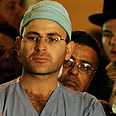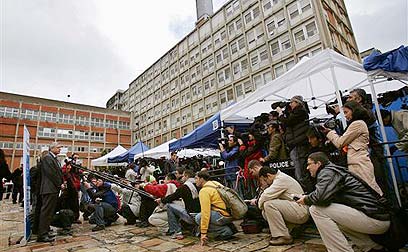
Sharon's moment of truth
Entire nation prays: Hospital officials say no change in prime minister's condition during the night; set to hold consultation for final assessment before attempting to bring Sharon out of deep sedation Monday morning; earlier, senior hospital sources say reports on PM's condition 'too optimistic'
(VIDEO) Israel crosses its fingers: Hadassah Ein Kerem hospital officials reported Monday morning that there has been no change in Prime Minister Ariel Sharon's condition during the night, and that it is still defined as serious but stable.
The prime minister's doctors are set to hold a consultation for a final assessment before attempting to bring the ailing PM out of deep sedation.
Barring any changes in Sharon's condition overnight, the doctors will embark on the slow, sensitive process that will hopefully see the prime minister emerge out of the induced coma. Only then will doctors be able to perform the needed tests and assess the damage sustained by the PM's brain.
Mor Yosef updates reporters Sunday (Courtesy of Channel 2)
In order to rouse Sharon, the medical staff will stop the inflow of anesthetic drugs into the prime minister's body. Sharon is expected to wake up in about 10 minutes, but experts say the seemingly short timeframe can be very difficult for those around the patient, as fears continue to build up.
Family facing difficult moments
Restlessness, confusion, and a rising blood pressure are some of the phenomena the prime minister is expected to experience as he comes out of his coma.

Addressing the press (Photo: AP)
“The awakening is almost always unpleasant, and it involves restlessness and even a wild behavior,” says Dr. Esti Dahan, a specialist the Kaplan medical center south of Tel Aviv.
“It’s not like in the movies, where the patient opens his eyes and thanks the doctors… this ugly arousal hurts the relatives, because the patient often looks insane and confused. It’s hard for the families to see their loved one in such a state, and they tend to think that this will be his permanent state in the future,” Dahan said.
The prime minister is expected to remain awake for several minutes, during which his neurological reactions will be examined. Later, physicians will sedate him again, and repeat the procedure the following day, and possibly every day in the week to come.
“The uncontrollable behavior associated with the arousal causes a high increase in the brain’s metabolic consumption, followed by a lessened blood supply to the brain. In order to protect it, the brain needs to be sedated once more, until the next day,” Dahan said.
Lowering expectations
Reports on Sharon's condition are "too optimistic," senior sources at Hadassah who are familiar with the situation told Ynet Sunday evening.
An optimistic interview with one of Sharon's surgeons, Dr. Jose Cohen, described the prime minister's condition "in a manner that can lead to interpretations that the PM's condition is better than what it is in reality," one source said.
Another senior source at the hospital addressed the prime minister's prospects for recovery and said: "The improvement detected is an x-ray improvement, and until we find the clinical equivalent it's too early to express optimism."
"The improvement (Hadassah Director) Professor Mor Yosef spoke about referred to the image received by the CT scan and shows the brain's structure, but not its functioning," the source said. "Only once the effects of sedation are gone will we be able to perform neurological tests, and only they can attest to the extent of damage."
Sharon’s condition remains serious but stable, and the latest CT scan conducted on him has indicated improvement.
'Moment of truth'
As noted above, doctors are expected to begin waking Sharon from his medically induced coma Monday morning, in what is regarded as “the moment of truth” that will allow them to examine the efficiency of the treatment the PM has been receiving ahead of the cognitive tests on his brain.
“We have been waiting for this since Wednesday – to know how the prime minister’s brain is functioning,” Hadassah Director Shlomo Mor Yosef told reporters Sunday.
Mor Yosef expressed cautious optimism, saying, “All the indicators point to an improvement in the condition of (Sharon’s) brain. The other parameters are normal, including the intracranial pressure, blood pressure and pulse. The prime minister does not have a fever.”
Mor Yosef thanked, among others,
President Moshe Katsav and Acting Prime Minister Ehud Olmert.
"They are giving us strength, along with all of Israel," he said.
The decision to reduce the dosage of sedatives injected into Sharon’s body was reached during a meeting of 10 expert physicians Sunday morning.
Following the consultation, Sharon underwent an additional CT scan where an improvement in his condition was revealed.
Earlier, one of Sharon's surgeons Dr. Jose Cohen was quoted by the foreign press as saying that the prime minister's chances of survival are very high, but that his ability to think and reason would be impaired. He also ruled out the possibility of Sharon returning to serve as prime minister.
Dr. Itay Gal and Meital Yasur-Beit Or contributed to the story










